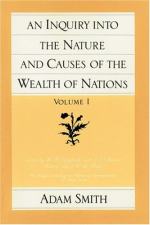|
This section contains 453 words (approx. 2 pages at 400 words per page) |

|
End of Book 3 & Book 4, Chapter 1 Summary and Analysis
The author writes briefly about the peasantry: a form of "mild slavery" wherein residents are viewed as part and parcel of the landscape they inhabit and as such, fall under ownership along with the land. There are a few limitations, including that spouses are not to be sold separately from one another in the event of a sale. He notes both a 12th century Catholic priest's written objection to slavery and also the 18th century Quaker removal of slavery from Pennsylvania. He then admits that freemen are less lazy about working since they get to actually benefit from doing so in a manner forbidden of slaves. The lord of the land would normally take 50% of the produce of the land but would also have the duty of supplying the tools and seeds or...
(read more from the End of Book 3 & Book 4, Chapter 1 Summary)
|
This section contains 453 words (approx. 2 pages at 400 words per page) |

|




